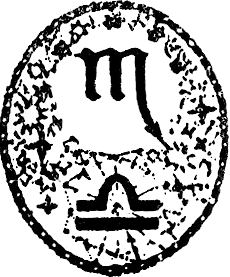Scorpion (publishing House) on:
[Wikipedia]
[Google]
[Amazon]
 Scorpion (Скорпион) was a
Scorpion (Скорпион) was a
 Scorpion (Скорпион) was a
Scorpion (Скорпион) was a Russian
Russian(s) may refer to:
*Russians (), an ethnic group of the East Slavic peoples, primarily living in Russia and neighboring countries
*A citizen of Russia
*Russian language, the most widely spoken of the Slavic languages
*''The Russians'', a b ...
publishing house which played an important role in the development of Russian symbolism in the early 1900s.
History
Scorpion was founded in1899
Events January
* January 1
** Spanish rule formally ends in Cuba with the cession of Spanish sovereignty to the U.S., concluding 400 years of the Spanish Empire in the Americas.''The American Monthly Review of Reviews'' (February 1899), p ...
by the philanthropist and translator Sergey A. Polyakov, and by the poets Valery Bryusov and Jurgis Baltrušaitis. Konstantin Balmont
Konstantin Dmitriyevich Balmont ( rus, Константи́н Дми́триевич Ба́льмо́нт, p=, a=Konstantin Dmitriyevich Bal'mont.ru.vorb.oga; – 23 December 1942) was a Russian symbolist poet and translator who became one of ...
was said to have suggested its title. Scorpion's initial agenda was two-fold: to meet the already well-developed demand for the so-called "Decadent
Decadence was a late-19th-century movement emphasizing the need for sensationalism, egocentricity, and bizarre, artificial, perverse, and exotic sensations and experiences. By extension, it may refer to a decline in art, literature, science, ...
" brand of literature and to form its own readership, interested in the "new art" of Russian modernism
Modernism was an early 20th-century movement in literature, visual arts, and music that emphasized experimentation, abstraction, and Subjectivity and objectivity (philosophy), subjective experience. Philosophy, politics, architecture, and soc ...
.
The preface to Scorpion's first ever catalog stated: "The Scorpion publishing house is interested mostly in works of art, but aims also for the fields of history of literature and aesthetic criticism. Willing to stand above the existing literary trends, it eagerly embraces everything that has real poetry to it regardless of which literary school any particular author belongs to. It is only vulgar things that we tend to avoid. Among Scorpion's other priorities is translating foreign authors who serve the New Art. The time has come to give our reader the opportunity to form their own opinions on new trends in literature."
The inclusion of the foreign literature into the Scorpion's fold was considered obligatory. This way the "European context" of the Russian symbolism was being highlighted. The first foreign book published by Scorpion, in March 1900, was Henrik Ibsen
Henrik Johan Ibsen (; ; 20 March 1828 – 23 May 1906) was a Norwegian playwright, poet and actor. Ibsen is considered the world's pre-eminent dramatist of the 19th century and is often referred to as "the father of modern drama." He pioneered ...
's '' When We Dead Awaken'', translated by Polyakov and Baltrušaitis.
Bryusov praised Scorpion as the center of the New Art in Russia, having brought together the Moscow (Bryusov, Balmont, Andrei Bely
Boris Nikolaevich Bugaev (, ; – 8 January 1934), better known by the pen name Andrei Bely or Biely, was a Russian novelist, Symbolist poet, theorist and literary critic. He was a committed anthroposophist and follower of Rudolf Steiner. Hi ...
) and Saint Petersburg's authors ( Dmitry Merezhkovsky, Zinaida Gippius, Fyodor Sologub
Fyodor Sologub (, born Fyodor Kuzmich Teternikov, , also known as Theodor Sologub; – 5 December 1927) was a Russian Symbolist poet, novelist, translator, playwright and essayist. He was the first writer to introduce the morbid, pessimistic e ...
), the latter associated with '' Severny Vestnik'' magazine.
Closely associated with Scorpion were miriskussniki Léon Bakst
Léon (Lev) Samoylovich Bakst (), born Leyb-Khaim Izrailevich Rosenberg (; – 27 December 1924),
and Konstantin Somov
Konstantin Andreyevich Somov (; – 6 May 1939) was a Russian artist associated with the ''Mir iskusstva'' ("World of Art") movement that began in the last decade of the 19th century. After the Russian Revolution, he eventually emigrated to Pa ...
, as well as Victor Borisov-Musatov
Victor Elpidiforovich Borisov-Musatov (; – ) was a Russian painter, prominent for his unique Post-Impressionistic style that mixed Symbolism, pure decorative style and realism. Together with Mikhail Vrubel he is often referred as the cr ...
, Modest Durnov and Nikolai Feofilaktov, among others.
Scorpion, which had neither commercial success nor any academic background, proved to be instrumental in uniting the Russian symbolists into one single movement. The last book published here was ''Poetry like Magic'' by Konstantin Balmont in 1915.
References
{{reflist Publishing companies of Russia Book publishing companies of Russia Publishing companies established in 1899 Publishing companies disestablished in 1915 1899 establishments in the Russian Empire 1915 disestablishments in the Russian Empire